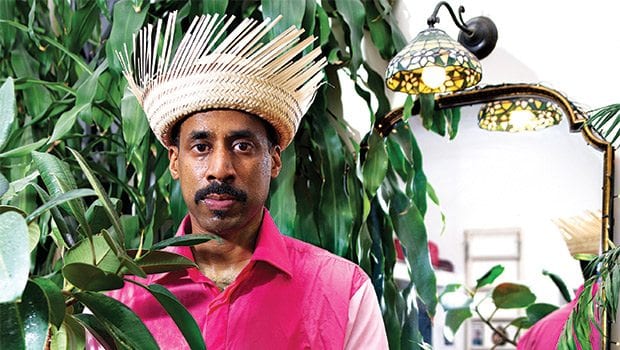
At the entrance of the ICA Boston’s “Nari Ward: Sun Splashed” exhibit, a yellow awning with the words “Happy Smilers” welcomes viewers into a facsimile of a Jamaican storefront. A native of Jamaica’s Saint Andrew Parish, Ward imbues this exhibit with timely pieces on his immigration to the United States, his life in New York and what he left behind.
On the web
For more information about “Nari Ward: Sun Splashed,” visit: www.icaboston.org/exhibitions/nari-ward-sun-splashed
Ward has a warm, friendly demeanor and many of his works radiate positive energy. The “Happy Smilers” moniker comes from a project he did in Sugar Hill, Harlem where he “canned” people’s smiles on the street and sold them for charity.
“That was a project where I felt younger every day,” says Ward. “I laughed every day.”
But the artist’s work has a serious twist. When you’re outside “Happy Smilers,” you hear an audio track of reggae music and people talking softly. When you go inside the installation, the sound of rainfall greets you. A fire escape hangs suspended in the middle of the room and the outer walls are built of squares of debris roped together by thick fabric straps. Here Ward upends the tourist notion that the Caribbean is always sunny, bright and happy.
Drawn to crisis
Much of his work is political, including “We the People,” installed in “Sun-Splashed.” The piece spells out the famous constitutional phrase, calligraphy and all, in shoelaces. It provides a marked contrast between the people on Capitol Hill manipulating laws and the everyday people in the shoelaces who are affected by those actions.
“I’m drawn to crisis,” says Ward. “That’s when the blankets are pulled back and we see where we are. That’s when people mobilize. And that momentum is what intrigues me.” He has had the Miranda rights printed on the back of his business card since the 1990s.
In an artist talk at the ICA last month, Ward spoke at length about identity. Many people categorize him as a Jamaican artist even though he’s been a U.S. citizen for more than a decade. But as a black man he hits barriers at every corner, preventing him from settling in to the culture of his new homeland. “Sun Splashed” visualizes these identity tensions. In “Naturalization Drawing Table,” audiences have the opportunity to participate in the performance, filling out immigration papers and taking an I.D. photo as though applying for citizenship. The process reveals how someone’s fate in this country can be decided by rigid social customs and haphazard regulations more than their personal merit.
Despite the sobering material in much of his work, Ward seems to have an unendingly positive attitude. Perhaps he kept a few of those Sugar Hill smiles for the rainy days. “There’s a lot of death, but there’s also a lot of life,” he says. “I think that unknown is the space where things can grow.”







